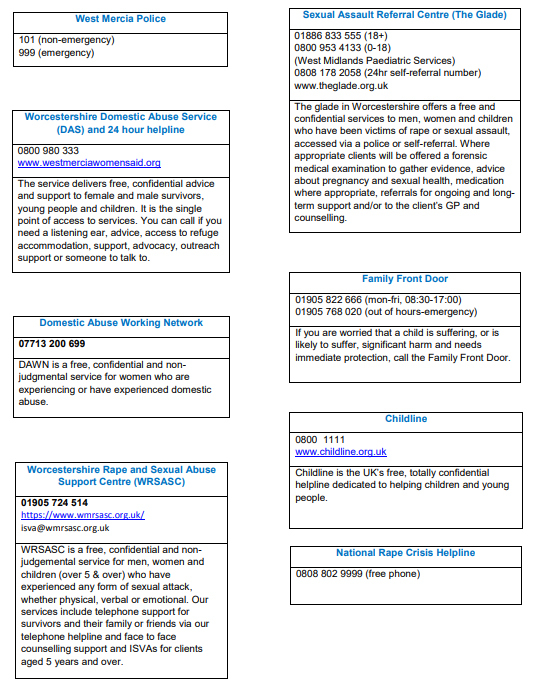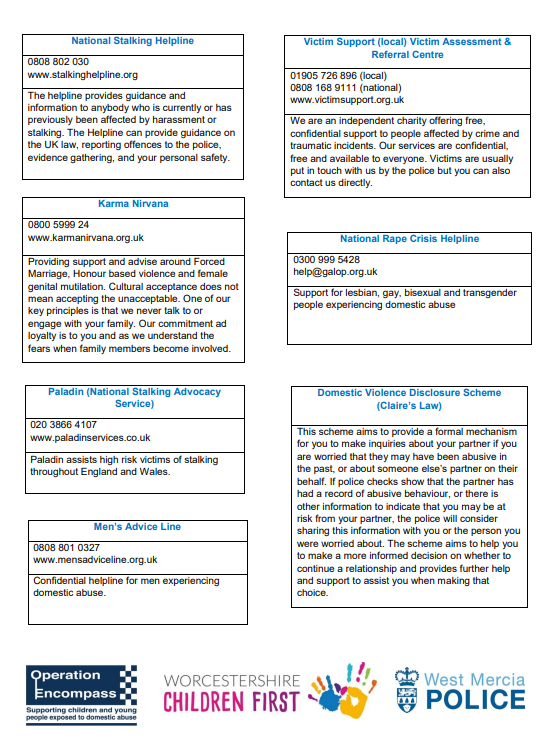- Home
- About Us
- Safeguarding
Safeguarding
At The Chase we consider the safeguarding of children to be a priority. All staff receive annual training to recognise the signs and indicators of abuse and neglect alongside other safeguarding concerns.
It is estimated that only 1 in 9 sufferers of abuse report it at the time that it is happening. It is vital therefore that staff know what to look for to identify young people suffering abuse who cannot speak out.
Staff understand their statutory duties that are outlined in Keeping Children Safe in Education (see safeguarding documents section) and will report any concerns, no matter how small, to the Safeguarding Team who will always respond to the concern raised.
Young people at The Chase are taught how to keep themselves safe through delivery of high quality PSHE and Character Education programmes alongside to assemblies, guest speakers, Enrichment days and the wider curriculum.
Young people are told that they can speak to any member of staff with whom they feel comfortable. This could be about something they are worried about themselves or if they are worried about another member of The Chase community. The member of staff will then be able to help the child access the support that they need; often this will be through the Safeguarding Team. Young people are always reminded that there can be no confidentiality if a young person is at risk of harm.
Child-on-Child Abuse including bullying and cyber-bullying are not tolerated at The Chase. Students are encouraged to speak to staff about such behaviour in the knowledge that it will be dealt with. The Child-on-Child Abuse policy, adopted from Worcestershire Children First guidance, outlines the flow diagram for consideration with any incident including risk assessment to minimise the risk of further incident and referrals to external agencies as necessary. The school will always work alongside the Police, Childrens Services and other agencies to ensure safeguarding of all parties.
As an added safeguard against a number of issues such as radicalisation, grooming and self-harm or suicide, the school uses a monitoring filter on internet searches requested by our young people.
All concerns raised the by the system are brought to the attention of the safeguarding team and are acted upon.
We adopt a preventative approach to safeguarding by working in partnership with parents and carers, through a range of parent information events and online guidance that can offer early help where required. The CARE pages of The Chase website provides information, advice and guidance for young people and their families about a huge variety of issues. The Early Help support offered by The Chase is outlined in ‘Supporting Parents and Young People’.
The Chase is part of Operation Encompass, which is a national scheme that operates jointly between Educational and Early Years Settings, Police and Health.
Operation Encompass is a report that is generated by police and sent to the Education/ Early Years setting, when a child or young person has experienced domestic abuse.
As an Educational setting, we have ensured that a member of our staff, (Mrs Pugh – Assistant Head and DSL), known as a Key Adult, has been trained in the Operation Encompass procedures allowing us to then use the information that has been shared, in confidence, to support the child/ren in our care.
The Domestic Abuse Act 2021 identifies children who experience domestic abuse as victims of domestic abuse in their own right.
We are keen to offer the best support possible to all the children in our care, and we believe this will be extremely beneficial for all those involved.
Local and national advice and support agencies who can help those who may be affected by domestic abuse:


The school works alongside the Local Authority services including Worcestershire Children’s First in order to protect young people from harm. The aim of Worcester Children First is to work with parents, carers and young people together to offer advice and support before a situation reaches crisis point.
For information about the guidance and services offered to young people and their families through Worcestershire Children’s First please visit their website:
WSCP has a statutory duty to co-ordinate how agencies work together to safeguard and promote the wellbeing of children and young people in Worcestershire and to ensure the effectiveness of local safeguarding arrangements. Their webpages contain a huge amount of information for parents and professionals working with young people.

The NSPCC is the leading children’s charity fighting to end child abuse in the UK. They help children who have been abused to rebuild their lives, protect those at risk, and find the best ways of preventing abuse from ever happening.
If you are being abused or you know someone who is, speak to a member of staff. No one should suffer in silence!
You can also visit the NSPCC website for advice and support regarding a number of safeguarding issues.
Sexual exploitation of children and young people under 18 involves exploitative situations, contexts and relationships where young people (or a third person or persons) receive ‘something’ (e.g. food, accommodation, drugs, alcohol, cigarettes, affection, gifts, money) as a result of them performing, and/or another or others performing on them, sexual activities. Child sexual exploitation can occur through the use of technology without the child’s immediate recognition; for example, being persuaded to post sexual images on the Internet/mobile phones without immediate payment or gain. In all cases, those exploiting the child/young person have power over them by virtue of their age, gender, intellect, physical strength and/or economic or other resources. The following are key facts taken from the local authority website:
- It affects both girls and boys and can happen in all communities.
- Any young person can be targeted but there are some particularly vulnerable groups: Looked After Children, Children Leaving Care and Children with Disabilities.
- Victims of CSE may also be trafficked (locally, nationally and internationally).
- Over 70% of adults involved in prostitution were sexually exploited as children or teenagers.
- Sexual violence or abuse against children represents a major public health and social welfare problem within UK society, affecting 16% of children under 16. That is approximately 2 million children.
The Child Exploitation Online Command (CEOP) is a law enforcement agency who pursue those who sexually exploit and abuse children. They prevent people becoming involved in child sexual exploitation, protect children from becoming victims of sexual exploitation and sexual abuse, and prepare interventions to reduce the impact of child sexual exploitation and abuse through safeguarding and child protection work.
If you are concerned that a young person is being exploited or would like to report exploitation, you can make a report directly to CEOP.
There are a number of other avenues for information and support regarding CSE for both young people and their parents:
Barnardo’s spot the signs offers advice for parents, professionals and young people on the signs of sexual exploitation and how to keep safe.
Parents Against Child Sexual Exploitation (PACE) is the leading national charity working with parents and carers whose children are sexually exploited.
The NSPCC website offers definitions, statistics, facts and resources about CSE.
Spotting The Signs of Child Sexual Exploitation from Health Education England:



